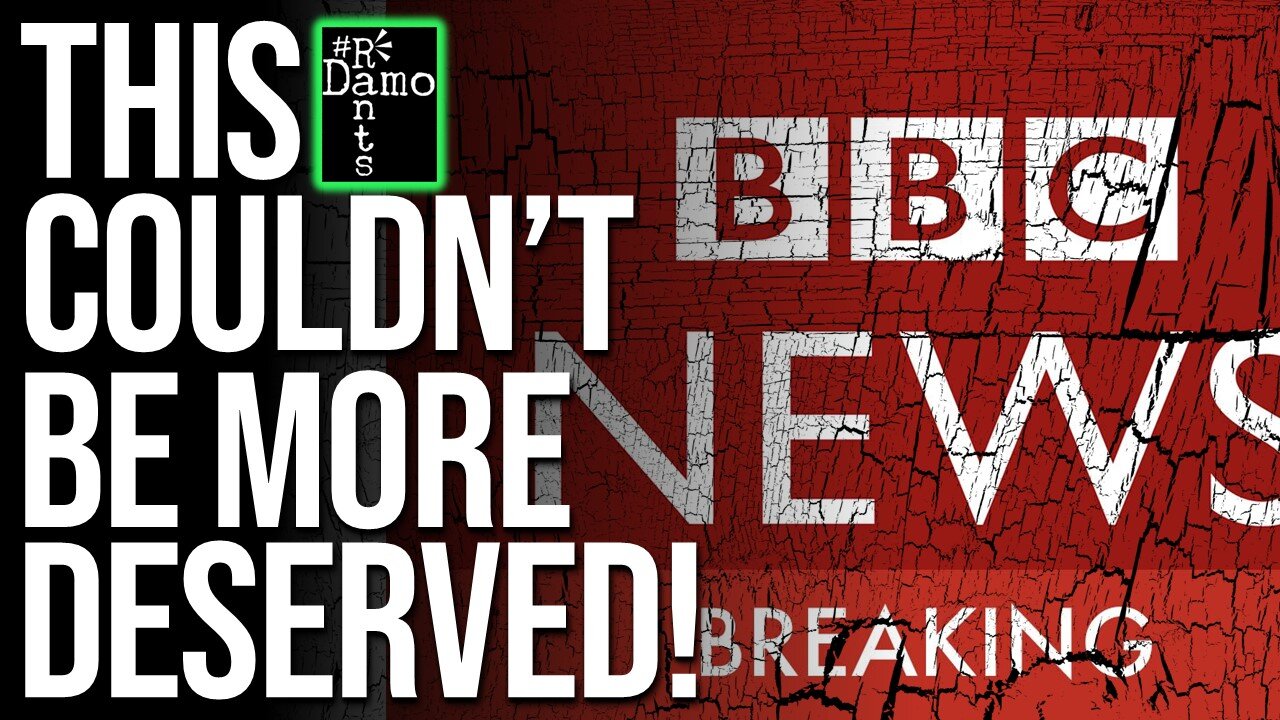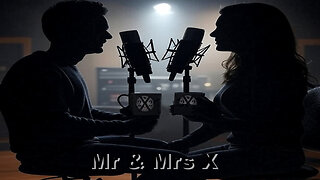Premium Only Content

BBC Are In BIG Trouble & They Aren’t Alone!
Right, so the BBC is in even more trouble and they aren’t alone either as our hopelessly pathetic PM Keir Starmer shows he’s even more of a weakling on the world stage than previously thought, having had a rather humiliating visit it the US to kiss the dayglo orange rear end of the pumpkin tinged president of the United States, Donald Trump.
What is connecting the two here is the further fallout still ongoing from the BBC’s decision to pull it’s excellent documentary Gaza: Life In A Warzone from it’s iPlayer streaming service at the behest of pro Israel lobby groups and it’s refusal to restore it, not only shining a light on the rampant pro Israel bias that has infected the BBC, but with hundreds of well known media figures having called out the BBC’s bias amplifying that fallout further.
But by wading into this debate as well, Keir Starmer has once more demonstrated his own pro Israel leanings in the most repulsive manner, but by doing so has highlighted the reality of how bad things have gone for him in the states with Trump, despite many a mainstream headline saying otherwise. Both BBC and Starmer getting trounced all in one go, what’s not to love? They deserve it don’t they?
Right, so the BBC has for so many years been regarded as a bastion of impartiality and journalistic integrity, a cornerstone of British culture and a global standard for public service broadcasting, certainly this is how they’d like to still be seen, but in this era of social media, this era when so many news alternatives exist, the BBC has slid in the reputation stakes significantly in recent years and the real biases that exist there have become more and more obvious and as such, more and more people have simply switched them off. One area even I would still hail the BBC as world leading though, is in its capacity to make fantastic documentaries, this has been a saving grace when its reputation has suffered so much in relation to current affairs I feel, yet they’ve now damaged their reputation on this score as well. The BBC’s recent decision to remove the documentary Gaza: Life in a Warzone from its iPlayer streaming service, coupled with its refusal to restore it, has sparked widespread condemnation and raised serious questions about the broadcaster’s commitment to impartiality. The fallout from this decision has not only damaged the BBC’s reputation but has also exposed the deep-seated pro-Israel bias within the organisation more than ever before and the political pressures that sustain it, given the Zionist governments both now and before Starmer’s Labour have had on it and how those same pro Israel figures have pervaded the organisations upper echelons.
At the same time that this fallout has been amplified by a recent letter signed by a who’s who of the well known and extremely angry, Labour leader Keir Starmer’s comments expressing concerns about pro-Palestine bias at the BBC—despite overwhelming evidence to the contrary—have further inflamed the controversy, exposing again his own unapologetic alignment with pro-Israel interests and hilariously, by doing so, has shone a greater light, on his weakness in response to Donald Trump in the US.
But lets start by returning to the documentary Gaza: Life in a Warzone, which I covered in another recent video, which has provided a harrowing and deeply humanising account of the daily struggles faced by Palestinians, from the perspective of the children there, living under Israeli occupation and military bombardment. It highlighted the resilience of Gaza’s children, the devastation wrought by repeated airstrikes, and the systemic violence and deprivation that define life in the besieged Strip.
The film has quite rightly been widely praised for its empathetic and unflinching portrayal of a reality that is often obscured or misrepresented in mainstream media and if you can find a copy online, it is being shared quite widely, I highly recommend giving it a watch.
This sort of programming is where the BBC is at its best, however it has sadly served to remind us that the pro Israel bias at the BBC appears to rule everything, since the BBC abruptly removed the documentary from its iPlayer platform, citing concerns about “impartiality” and “contextual accuracy.” This decision came after sustained pressure from pro-Israel lobby groups, the usual suspects who have nothing better to do than campaign for Israel no matter what they do and who accused the documentary of being “biased” and “one-sided.” It was a documentary about life in Gaza from the perspective of Gazan children, so for one, it was only examining one side and there wouldn’t have been a peep from them if this was an Israeli focussed documentary and for two it’s a group of kids. How pathetic must you be to be afraid of what a child might say? Well, the removal sparked immediate outrage among journalists proper ones that is - activists, and of course the general public, who saw it as an act of censorship and a betrayal of the BBC’s public service mandate, which if course it is. If you pay the licence fee, you expect to be served accordingly by the service you fund, yet we get propagandised more and more because the BBC is unable to be impartial, it isn’t allowed clearly.
The backlash has been justifably swift and damning. Over 700 media professionals, including prominent filmmakers, journalists, and academics, signed an open letter organized by Artists for Palestine UK, condemning the BBC’s decision as “dehumanising censorship” and a “disgraceful act of complicity in the erasure of Palestinian suffering.” Signatories included renowned figures such as filmmaker Ken Loach, actress Miriam Margolyes, and author Naomi Klein, who have accused the BBC of bowing to political pressure and perpetuating a narrative that marginalises Palestinian voices.
The letter is damning, a brief excerpt stating:
‘By removing this documentary, the BBC is not only silencing the stories of Gaza’s children but also reinforcing a systemic bias that dehumanises Palestinians and legitimises their oppression. This is not impartiality; it is complicity.’
The signatories called on the BBC to restore the documentary immediately and to uphold its commitment to journalistic integrity and freedom of expression.
The BBC’s justifications for removing the documentary have been widely criticised as disingenuous and flawed. In a statement, the broadcaster claimed that the film lacked “sufficient context” about the broader Israeli-Palestinian conflict and failed to provide a “balanced perspective.” However, critics have pointed out that this reasoning is both hypocritical and inconsistent with the BBC’s treatment of other documentaries and news coverage.
For example, the BBC has frequently aired programs and documentaries that focus exclusively on Israeli perspectives, often without providing equivalent context about Palestinian experiences or the historical roots of the conflict. This is quite obviously a two-faced double standard, a double standard that underscores the BBCs pro-Israel bias and its reluctance to challenge dominant narratives that favour Israel’s political and military interests and taken together, with the complaints received, is an organisation therefore that comes across as unable or unwilling to change from that.
Moreover, the claim that the documentary lacked context is particularly egregious given the documentary’s focus on the human impact of Israel’s policies and from the eyes of the kids living through it at that. The film was not intended to be a comprehensive history of the conflict but rather an examination of how ordinary Palestinians, especially children, navigate the trauma and deprivation imposed by occupation and war. By demanding “context” in this case, the BBC is effectively imposing an impossible standard upon itself as a get out clause that undermines the value of both their ability to produce world class documentaries combined with human empathy in journalism, when the standard of journalism at the BBC, for as good as their documentaries are, is rock bottom and completely compromised by pro Israeli bias and pressure from government and outside groups, but also from within.
One such figure who’s name has risen to some prominence in relation to the BBC’s news output and the language used and the pro Israel narrative constantly being pushed is Raffi Berg, the BBC’s Middle East editor, who has been accused of downplaying Israeli violence and amplifying narratives that justify Israel’s actions.
Berg’s influence within the BBC has reportedly contributed to a culture of self-censorship, where journalists and producers are discouraged from covering Palestinian issues in a way that might be perceived as critical of Israel and when Israel are the perpetrators of a genocide, this is an unforgivable failure by what is supposed to be the most trusted news outlet in the UK, now one of the worst and people increasingly know it. This internal bias has created an environment where stories like this one, even told as it is by children, is seen as too controversial or risky, even when they adhere to the highest standards of journalistic integrity and that makes the BBC weak and untrustworthy.
The controversy surrounding the BBC’s decision has also drawn attention to the political dimensions of the issue, particularly the role of Keir Starmer and the Labour Party.
During his recent visit to the White House, Starmer expressed concerns about “pro-Palestine bias” at the BBC, a statement that has been widely ridiculed given the overwhelming evidence of the broadcaster’s pro-Israel slant and which is in no small part due to Starmer’s government leaning on them as well, as governments always do. Starmer’s will always attempt to align himself with pro-Israel interests, because they fund him, he owes the Israel Lobby everything and his rancid party duly follows suit as well, many other ministers also benefitting from pro Israel donations.
Starmer’s visit to the White House was itself a source of embarrassment though, karma for Keith, and you can see why here:
If you wanted a perfect example of the influence Starmer has on Trump, it got summed up pretty much by Trump saying that’s enough and cutting him off, at which point he meekly buttons it, but the more disturbing part, apart from Trump going off on a bizarre tangent about Obama, was Starmer stating that the government had spoken to the BBC on the matter of this documentary, so were the BBC ordered to pull it by the Minister for Culture, Media and Sport, Lisa Nandy? More questions have been raised that need answering here.
Trump’s dismissive attitude toward Starmer reinforces a widespread belief that Starmer simply can’t assert himself on the international stage is weak and largely incoherent, as well as sickeningly sycophantic.
Ultimately, this controversy over Gaza: How To Survive A Warzone has shone a big fat spotlight on issue of media bias in coverage of the Israeli-Palestinian conflict and government involvement in that, as well as by other factors both outside and inside the BBC. By removing the documentary, the BBC has reinforced the perception that mainstream media outlets are unwilling or unable to challenge the dominant narratives that favour Israel and marginalise Palestinians. Therefore the support for independent and alternative media who cannot be leant on in the same way, is all the more important so do make sure you support your favourite outlets however you can.
For more on this story, please do check out my other video on the axing of this documentary as my video recommendation for you here as your suggested next watch. Please do hit like, share and subscribe before you do so though, so as to ensure you don’t miss out on all new daily content dropping, plus it supports the channel at the same time, which is massively appreciated and I will hopefully therefore catch you on the next vid. Cheers folks.
-
 19:53
19:53
MetatronHistory
21 hours agoRome VS Greece - Ultimate Clash of Civilizations Explained
49.6K15 -
 LIVE
LIVE
The Big Mig™
7 hours agoThe Big Mig Show's Greatest Hits w/ Americas Future, Karmageddon, Operation Gideon,..
159 watching -
 1:32:33
1:32:33
VapinGamers
6 hours ago $6.08 earnedTools of the Trade - EP12 The Art of Story Telling with MidnightinTheMountains - !rumbot !music
34.9K4 -
 3:09:50
3:09:50
SOLTEKGG
5 hours ago🔴LIVE - Battlefield 6 - Going Pro in RED SEC
33.5K2 -
 5:19:03
5:19:03
Midnight In The Mountains™
7 hours agoThe Midnights Play Arc Raiders | Loot Scoot and KILL | Crypto Wallet up n running GO JOIN THE BETA!
26.1K4 -
 53:25
53:25
X22 Report
8 hours agoMr & Mrs X - Trump Is Using The Same Tactic As Our Founding Fathers To Rebuild America - EP 17
102K37 -
 3:15:31
3:15:31
PudgeTV
5 hours ago🟣 Arc Raiders - Gaming on Rumble | Going Topside w My Daughter’s Husband
18.9K2 -
 2:05:43
2:05:43
LFA TV
1 day agoRUMBLE RUNDOWN WEEK 7 with SHAWN FARASH 11.22.25 9AM
152K15 -
 3:23:01
3:23:01
ttvglamourx
6 hours ago $1.84 earnedGLAMOURX VS CALL OF DUTY LOBBIES !DISCORD
21.5K4 -
 6:55:26
6:55:26
DannyStreams
8 hours agoSaturday Morning Tarky
17.2K1